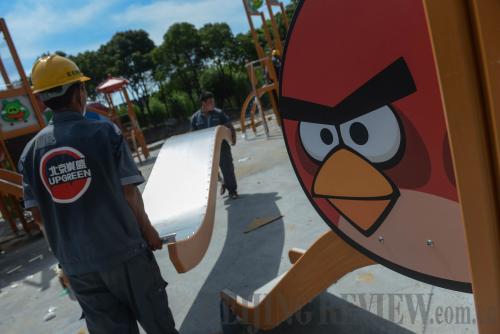|
 |
|
GAME COMES TRUE: A theme park featuring characters of the famous mobilephone app Angry Bird is under construction in Haining, Zhejiang Province, on July 2. The park is expected to open in October (HAN CHUANHAO) |
Price Probe
Several infant milk formula producers, mainly foreign, are under anti-trust investigation by the National Development and Reform Commission (NDRC) for allegedly fixing prices.
Baby formula companies under investigation include Nestle SA, Abbott Laboratories, Mead Johnson Nutrition Co., Danone's Dumex and Wyeth Nutrition, as well as a local company Biostime International Holdings Ltd.
The NDRC has evidence that these companies charged higher prices in the Chinese market, with price increases of about 30 percent since 2008, said a report from People's Daily.
Concerns about the safety of domestic milk powder, especially after a melamine-tainted milk powder scandal in 2008, have fueled Chinese demand for foreign infant formula. Media reports say that foreign brands now account for about half the sales of baby formula in China.
"Boosted by increasing market demand, foreign baby formula companies have raised their prices every year," said Wang Dingmian, executive council member of the Dairy Association of China. "Now, the consensus is that China is home to the most expensive infant milk in the world."
Financing Support
The People's Bank of China, the country's central bank, said on July 1 that it has arranged a 12-billion-yuan ($1.94-billion) re-lending quota to boost financial support for small and micro-businesses and rural areas.
Re-lending is a monetary tool used by the central bank to increase the liquidity of financial institutions and guide credit flows.
The central bank requires that funds from the quota be credited to small and micro-businesses, as well as the agricultural sector, rural areas and farmers.
About 162 billion yuan ($26.44 billion) has been accumulated in the re-lending quota to date, and 45 percent has gone to small and micro-businesses and 27 percent to rural areas.
Trading HK Stocks
China's planned qualified domestic individual investor program, known as QDII-2, may allow investors to buy securities products in the Hong Kong Exchanges and Clearing Ltd. (HKEx), according to a Shanghai Securities News report on June 28.
China's central bank has decided to set up the QDII-2 pilot program in south China's Guangdong Province, and is waiting for final approval from the State Council.
The investment scheme will first target HKEx and then expand to other financial products in the Hong Kong market, and gradually to products in other parts of the world.
Qualified domestic individual investors should have three years of experience in stock investment and financial assets equivalent to no less than 1.5 million yuan ($244,000).
The lower and upper limits of a single individual investor for overseas investment are set at 500,000 yuan ($81,600) and 20 million yuan ($3.26 million) respectively.
To control risks, QDII-2 funds should circulate in a special account. It cannot be transferred into elsewhere, said the document.
Currently, only institutional investors in China can invest in overseas capital markets, via the qualified domestic institutional investor program, or QDII-1.
| 